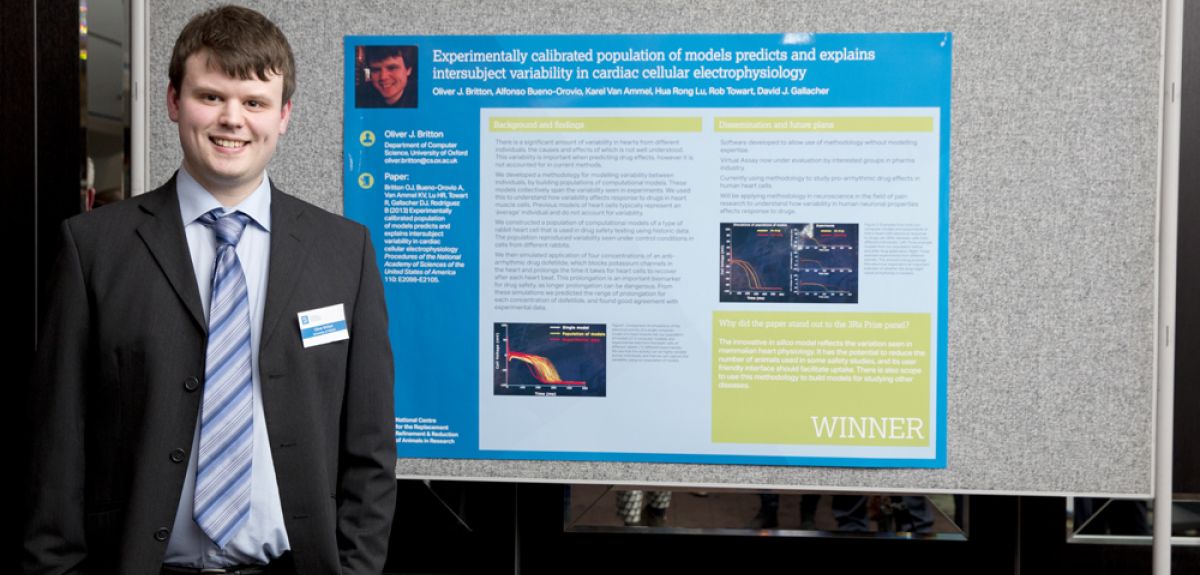
Image courtesy of NC3R
Oxford University student wins prize for alternative to animal research
A doctoral student has won an international prize for research which could reduce the use of animals in life sciences.
Oliver Britton, a DPhil student with Professor Blanca Rodriguez at the Department of Computer Sciences, won the award for a new approach to computer modelling that could potentially reduce the number of animals used in research, especially for safety testing new drugs.
The National Centre for the Replacement, Refinement and Reduction of Animals in Research (NC3Rs) promotes new approaches to replace, reduce and refine (the 3R's) the use of animals in scientific research. Each year, its NC3Rs prize is awarded to highlight an outstanding original contribution to scientific and technological advances in the 3Rs.
There is overwhelming scientific consensus worldwide that some research using animals is still essential for medical progress. Oxford University is committed to the 3R's as part of its extensive biomedical research which saves lives and relieves suffering around the world.
In an award ceremony earlier this week, Mr Britton became the first doctoral student to receive the NC3Rs prize, for his paper building a computer model of cardiac electrophysiology. This is also the first time that the NC3Rs prize has been awarded to computer modelling research.
The new computer model includes individual variations in 'normal' heart properties that traditional models have tended to ignore.
This new approach could potentially identify drug compounds that could be toxic to the heart, before animal studies are done. As confidence in the model grows, it could replace some animal studies altogether.
Mr Britton said, 'It's great to have our research recognised as having a potential impact on the 3Rs, and winning the prize helps with publicising our work to the audience who might be interested in it. We plan to use the prize grant to apply our methodology in neuroscience, specifically pain research in humans, through a collaboration we have developed with an industrial partner. We will investigate how variability between individuals alters the response of different types of pain-sensitive neurons to drugs.'
The computer model has also been developed into a user-friendly software package called Virtual Assay (developed by Oxford Computer Consultants Ltd.), which should increase industry uptake for use in drug safety testing, as it can be used without the need for specialist programming and modelling experience.
Professor Ian Kimber OBE, 3Rs Prize panel chair, said 'Mr Britton's paper really stood out to the panel because of the model's potential to be used to replace early-stage animal tests in drug safety studies, across a broad range of disciplines. The model has also been developed into a piece of user-friendly software, encouraging uptake and use by industry, which could have large scale impacts on the reduction of animals in research.'
The work reported in the paper was supported by ISIS Innovation, a technology transfer company set up by Oxford University, and by the EPSRC Impact Acceleration Account awarded to University.
A report of the research, 'Experimentally calibrated population of models predicts and explains intersubject variability in cardiac cellular electrophysiology', by Oliver J. Britton, Alfonso Bueno-Orovio, Karel Van Ammel, Hua Rong Lu, Rob Towart, David J. Gallacher, and Blanca Rodriguez, is published in PNAS.
 Ground-breaking study reveals how COVID-19 vaccines prevent severe disease
Ground-breaking study reveals how COVID-19 vaccines prevent severe disease
 Novel triple drug combination effective against antibiotic-resistant bacteria
Novel triple drug combination effective against antibiotic-resistant bacteria
 Researchers discover how immune cells hunt down cancer around the body
Researchers discover how immune cells hunt down cancer around the body
 New algorithm supercharges climate models and could lead to better predictions of future climate change
New algorithm supercharges climate models and could lead to better predictions of future climate change
 New study to improve vaccines and therapeutics development
New study to improve vaccines and therapeutics development